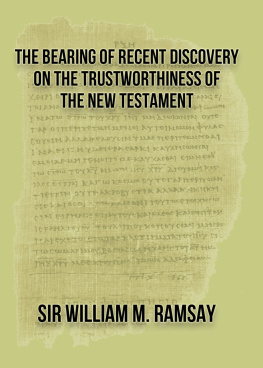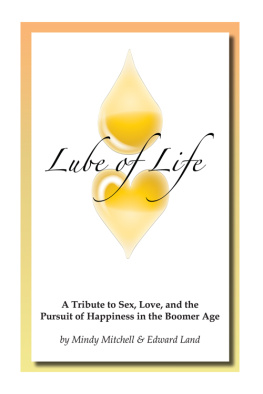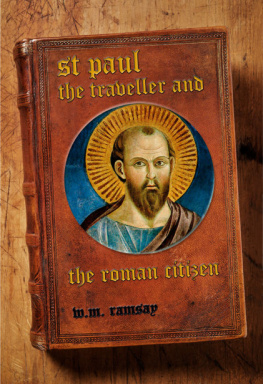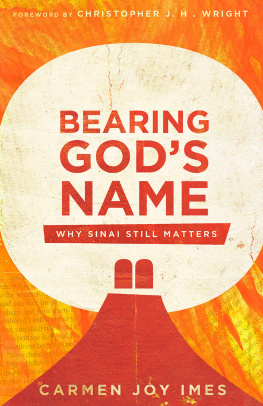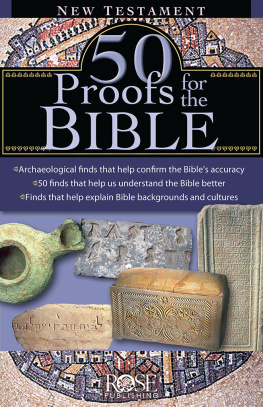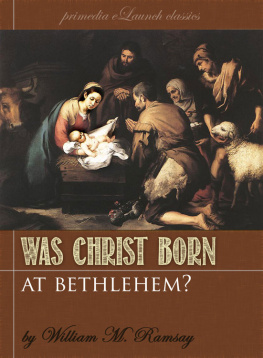William Mitchell Ramsay - The bearing of recent discovery on the trustworthiness of the New Testament
Here you can read online William Mitchell Ramsay - The bearing of recent discovery on the trustworthiness of the New Testament full text of the book (entire story) in english for free. Download pdf and epub, get meaning, cover and reviews about this ebook. City: Grand Rapids, year: 1953, publisher: Baker Book House, genre: Science. Description of the work, (preface) as well as reviews are available. Best literature library LitArk.com created for fans of good reading and offers a wide selection of genres:
Romance novel
Science fiction
Adventure
Detective
Science
History
Home and family
Prose
Art
Politics
Computer
Non-fiction
Religion
Business
Children
Humor
Choose a favorite category and find really read worthwhile books. Enjoy immersion in the world of imagination, feel the emotions of the characters or learn something new for yourself, make an fascinating discovery.
- Book:The bearing of recent discovery on the trustworthiness of the New Testament
- Author:
- Publisher:Baker Book House
- Genre:
- Year:1953
- City:Grand Rapids
- Rating:4 / 5
- Favourites:Add to favourites
- Your mark:
- 80
- 1
- 2
- 3
- 4
- 5
The bearing of recent discovery on the trustworthiness of the New Testament: summary, description and annotation
We offer to read an annotation, description, summary or preface (depends on what the author of the book "The bearing of recent discovery on the trustworthiness of the New Testament" wrote himself). If you haven't found the necessary information about the book — write in the comments, we will try to find it.
The bearing of recent discovery on the trustworthiness of the New Testament — read online for free the complete book (whole text) full work
Below is the text of the book, divided by pages. System saving the place of the last page read, allows you to conveniently read the book "The bearing of recent discovery on the trustworthiness of the New Testament" online for free, without having to search again every time where you left off. Put a bookmark, and you can go to the page where you finished reading at any time.
Font size:
Interval:
Bookmark:
THE BEARING OF RECENT DISCOVERY O N THE TRUST W ORTHINESS OF THE NEW TESTAMENT
BY
S ir W. M. RAMSAY
FOURTH EDITION
HODDER AND STOUGHTON
LIMITED LONDON
m c mxx
The following pages have been almost wholly re written since the Great War began, and i n one respect show the influence of the situation. The veryexist ence of our country was staked on the uncertainissue; and the individual could not hope or wish to survive the nation. I feltthat this book might be my last will and testament, and attempt ed to put into it the gist of what I had learned in thestruggle of life and the study of books.
I describe no striking discoveries. My aim is to statecertain principles that result from modern dis covery,and to illustrate their bearing on the New Testam ent.The method is to show through the ex amination, wordby word and phrase by phrase, of a few passages, which have been much exposedto hostile criticism, that the New Testament is unique in the compactness, thelucidity, the pregnancy and the vivid tru thfulness ofits expression. That is not the character of one or two only of the books thatcompose the Testament: it belongs in different ways to all alike, though spacefails in the present work to try them all.
A great discovery has resulted from modern investi gation, viz. the wideand familiar use of writing in Western A sia as furnishing the basis on which the Roman bureaucratic administration wasable to rest. That is really a great principle; and yet how little is itsimportance understood! I adhere to the inferencesdrawn in the first chapters of the "Letters to the Seven Churches"and in the paper on " The First Written Gospel" in " Luke thePhysician and other Studies in the History of Religion Yet many of u s will wait until some German scholarhas stated the same conclusions before acceptingthem.
The only way, the necessary and the useful method, is to goover the New Testament sentence by sentence, and to show how great principlesand big ideas form the te xture of the thought everywhere.
Carrying out the view statedtwenty years ago in "St Paul the Traveller," pp. 303 to 309, I see inthe earliest Church history the religion of freedom engaged in a conflict withthe Imperial power. Luke shows the conflict beginning at Christ's birth. Thestrange s ituation in which He was born was caused byan order of Augustus, a world-wide order express inga vast force that moves through many centuries of history and always makes forslavery. The worse side of Imperial policy, as embodied in that order, droveMar y from Nazareth to Bethlehem. And what was theresult ? Only the fulfilment of the ancient truth and prophecy that inBethlehem, the humble village which was the centre of old Hebrew tradition,there must be born, when the fulness of the time was come, the King of the Jews and the Saviour of the world. Autocracycompasses its own destruction, and the freedom of the Divine Will works outits perfect expression through the autocrats error.
The episodes in the first and third Gospels, describ ing the circums tances of theSaviours Birth, are of the highest importance; Luke sets that event in relation withthe tides and forces of Imperial world-history; and Matthew describes how thetraditional wisdom of Asia recognized the new-born King. On the other hand, Joh n says nothing about such mundane matters, because histhought moves on a far higher plane, and his eye is fixed only on the infiniteDivine nature; while Mark restricts himself to recounting what he had learnedabout the public career of Jesus as a Teache r.
It is necessary to insist on the immense importance ofthese episodes, and to illustrate this from various points of view, pp. 145 f.,248 f., 272 f. No one can comprehend Luke or Matthew, so long as his mind isclogged with the old ideas about the puer ility anduntrustworthiness of those episodes. Yet I am wrong in calling those ideas old ; here is what was said only a few yearsago by one of the most distinguished and famous of Scottish theologians in hiscommentary on Lukes narrative, 11. 1 f. :
"One could almost wish thatv. 2 had been omitted, or that there were reason to believe, as has beensuggested by several writers, that it is a gloss that has found its way intothe text, and that Luke is not responsible for itso much trouble has it givento commentators."
These words were written by Dr. A. B. Bruce in the maturityof his career, after a life devoted to the exposition of the Gospels. Theycrystallize in a gem of criticism the inadequate method and the falseness ofview, which could result in t he thought that theconvenience of the commentator should be put as a test of truth.
The breadth and dignity of the ideas in the New Testamentare such that its outlook over human history must be ranked on the loftiestlevel. For example: Not merely are a ll the statements inLuke ii. 1-3 true. They are also in themselves great statements, presenting tous large historical facts, world-wide administrative measures, vast forces work ing on human society through the ages," see p. 304.Those who miss this may delude themselves with thefancy that the passage is a legend or an invention. Those who have eyes andhistoric sense to see know that nothing but truth can be so grand and sosimple.
In the prefaces to several books, I have referred to thecharge brought against me of having slighted theopinions of the Germans. I have learned much from the greater German scholarsin my own subject; but their teaching was to judge for myself and to accept no mans dictum on the credit of his name andfame. In 1885 Mommsen spent a week in Oxford as myguest, and among many memories I will quote one: we were speaking of Englishtranslations of German books, and he said, you should not translate our books: you ought to write history from yourpoint of view: we need to see the past from your point of view as well as from ours
I do not follow the prevailing tendency of German criticismof the New Testament. It is wrong because it is narrow, and because it judgesfrom erroneous premises and unjustifiable prejudices; and one wel c omes any signs of a return to asaner and better in formed judgment. Many verylearned scholars have been blind to the grandeur of the thought in the NewTestament; and the cosmic ideas which inform it throughout have generallypassed over their heads. Whe re they dimly caught themeaning of a cosmic idea, they called it eschatological . This mirage of the eschatology " of the New Testament arose fromfettering great moral truths, expressed in terms of the infinite, with theprecise hard and wholly in adeq uate expression of dull logical conception.
In the few cases where questions of text are concerned Igive no details, but simply state the verdict of Westcott and Hort and my ownargu ments. No reading is adopted which they do notprint as resting on good authority. Any one thatwishes to go behind them ought to investigate the evidence for himself. Itmust, however, be added that the work of those two great scholars seems to mefar from being final, and their method results in establishing the text of a fo urth or late third century school; but the school containedmen of real learning, whose text was a great achievement. Now, however, it is necessary to go back behind thattext to an older period.
It was not easy to complete the book amid the many duties and the mental strain imposed by the Great War; and Iapologize for many deficiencies whose existence I dread. They will rise beforeme when it is too late.
I owe the photographs to Lady Ramsay, and the indexes tothe Rev. Principal Perry, Coates Hall, Edi nburgh. Itis an honour to be able to speak of the latter as one of my own pupils atAberdeen.
W. M. RAMSAY.
December, 1914.
PART I. PRELIMINARY
PART II. THE LECTURES
PART III. ASSOCIATED QUEST IONS
Next pageFont size:
Interval:
Bookmark:
Similar books «The bearing of recent discovery on the trustworthiness of the New Testament»
Look at similar books to The bearing of recent discovery on the trustworthiness of the New Testament. We have selected literature similar in name and meaning in the hope of providing readers with more options to find new, interesting, not yet read works.
Discussion, reviews of the book The bearing of recent discovery on the trustworthiness of the New Testament and just readers' own opinions. Leave your comments, write what you think about the work, its meaning or the main characters. Specify what exactly you liked and what you didn't like, and why you think so.

